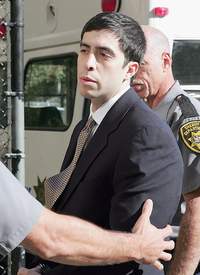Man who decapitated flower girl in Long Island wedding crash likely to get life sentence
The murder weapon was a pickup truck. The killer? An insurance salesman who had at least 14 drinks in him.

On Wednesday, 25-year-old Martin Heidgen learns his punishment after being convicted of two counts of second-degree murder for driving drunk the wrong way down a darkened Long Island highway before slamming head-on into a limousine carrying a family home from a wedding.
The impact of the July 2005 high-speed collision claimed the lives of 7-year-old flower girl Katie Flynn and the limo driver, Stanley Rabinowitz, 59.
Prosecutors, who showed jurors a video of the crash several times during the trial, contend Heidgen never tried to stop and turned slightly toward the limousine moments before impact. Arguing he was in "self-destruct mode," they successfully convinced a jury Heidgen's actions constituted a "depraved indifference to human life" and are expected to seek the maximum sentence of 25 years to life.
Experts say murder convictions in drunken-driving cases are extremely rare.
Defense attorney Stephen LaMagna does not deny that his client should be held responsible, just not for murder.
"This is a kid who drank too much and got lost on the way home," the attorney pleaded with jurors during his closing argument.
He said he is confident the verdict will be overturned by an appeals court. "I think they will see it for what it is," LaMagna said after the verdict. "Under the law as it exists in New York ... this is not murder."
During the trial, LaMagna questioned the accuracy of blood tests that revealed his client had a blood-alcohol reading of 0.28 percent, three and half times the legal limit in New York.
After the verdict, he claimed jurors discussed the case with their relatives, conferred secretly outside the jury room and weighed facts they should not have considered, including an erroneous report that Heidgen had a previous DWI conviction.
Acting state Supreme Court Justice Alan Honorof ruled after a day-long hearing earlier this month that he was "unconvinced" that any juror misconduct took place.
Honorof took the unusual step of sequestering the jury after its fourth day of deliberations when they reported they were unable to decide between a murder or a manslaughter conviction. Although LaMagna consented to the sequestration, several legal observers said he may be able to successfully argue the jurors were pressured into returning a murder conviction, which came back the following day.
Jury forewoman Loy Malcolm later said she regretted voting for a murder conviction and said she did so only after tiring of the tense bickering inside the jury room, the AP says.
Several members of the Flynn and Rabinowitz families were expected to make statements before acting Honorof imposes his sentence; the mininum sentence is 15 years to life.
On the opening day of the trial last September, Katie Flynn's parents and grandparents testified about the night of the crash, sometimes tearfully recalling how they were all reveling in the afterglow of a glorious family wedding in Bayville when their lives suddenly changed.
"It was quiet, and then the car exploded," recalled Jennifer Flynn, who found her decapitated daughter moments later. She said she heard her 6-year-old, Grace, crying, but "I didn't hear Kate."
Then she "saw her head on the floor and there was hair over her face. ... I moved her, and it was just her head that was there, and I never saw her body."
Moments later she remembered telling her father, "Kate's dead."
Subscribe to Pravda.Ru Telegram channel, Facebook, RSS!




